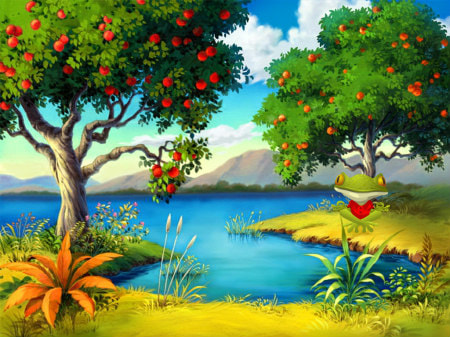After we finished our breakfast and social chit-chat, Dharma began my lesson. "Irwin, my boy, the frog who looks deep into nature will then understand everything better." All frogs love the outdoors but since I seem to have a special affinity for spending time in the solitude of nature I was very intrigued by Dharma's opening words. "Have you ever felt rejuvenated, refreshed, and just plain happy after spending only a little time outside Tadpole?" "Why yes, Sir," I replied, "I always feel much better after I've been outside." "Well, son," my teacher continued, "there is growing scientific evidence that suggests that spending time in nature can have very real physical and mental health benefits." Dharma isn't one for spouting scientific research but he knows that the best way to reach me is with facts and figures. He immediately had my full attention. "Son, you don't need to spend the entire day backpacking through the countryside to achieve these results. We are learning that even spending a few minutes walking in your local park can be very beneficial. Some research has shown that you don't need to go outside at all. You simply need a window that looks out on trees or a grassy spot." Okay, so I get it; nature helps to heal us but what I didn't understand was how it helps understand everything else. As if he could read my mind, my wise teacher explained.
"Observe nature and your question will be answered, Tadpole. Once we learn to understand the law of impermanence, we are well on our way to being able to embrace all that our lives have to offer. Life, like nature, is ever changing. All we need do is look at the changing seasons, the trees, the rise and fall of the ocean's tides, the Earth's constant rotation, the cycle of the moon, and the death and rebirth of all living matter. Suffering does not exist within these natural occurrences. Humans, and sometimes we frogs too, suffer when the mind mistakes permanence for impermanence. The mind tends to cling to those experiences that are pleasant...not wanting them to pass. Too, the human mind also tries to repel those things that are unpleasant. But what is missing is living in the present moment, as nature does. Humans, for the most part, look at life through a distorted lens; one that is often clouded by the dust of past experience and/or future anticipations. This can make life appear as if it's all or nothing. What I mean, my son, is that life can appear always good or always bad. But it is only a perception. It isn't real. Everything is neutral and only we can decide how we want to see it. Take nature, for example. does the tree suffer when it loses it leaves? Or does the Earth suffer when there is a hurricane? The answer is no. These are normal cycles of change. And the sun always comes up the next day. Do you follow, Irwin?" I did. This weeks lesson was finally beginning to sink in.
It turns out the frog's, and human's, existence is no different. Every cell in our bodies is changing; they die, they renew, they shift. The same thing with our moods and our circumstances. Life is constantly in motion. With stagnation, comes death. Life is about change and change simply happens. it has no inherent meaning. Only what we attach to it. Every experience happens and then passes. And as in nature, the sun follows the night.
After our meal was finished and the last of the tea was drunk, Dharma hopped off to see his next student. As I sat alone in my tiny kitchen I pondered my friend's very wise words; "The frog who looks deep into nature then better understands everything better." In order to have a new beginning, we must first say goodbye to the past. Change is inevitable and learning to not only cope with it but to embrace and welcome it is the most valuable lesson any of us can learn.
Mother Nature is not only our best healer, she is also our best teacher.
Peace.

 RSS Feed
RSS Feed